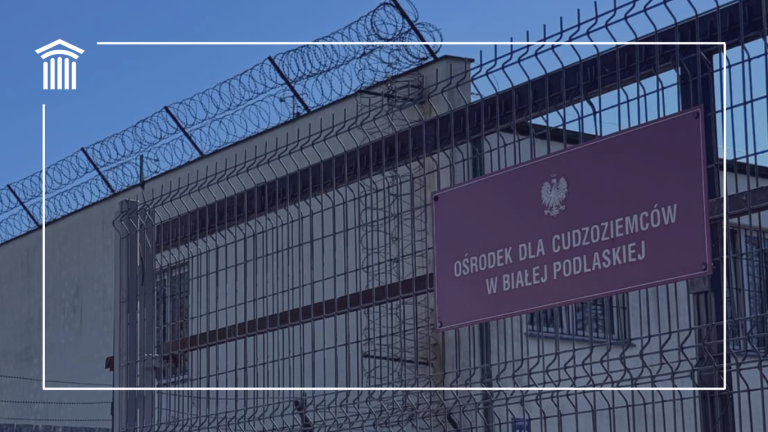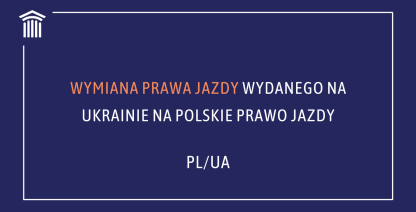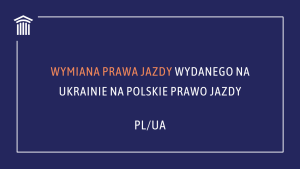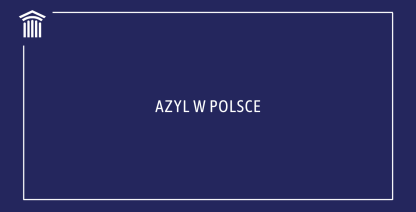Administrative detention is a form of restriction of liberty that may be used against a foreigner in the course of administrative proceedings. It entails placing them in a guarded centre or an arrest for foreigners. It is not a result of having committed a crime, but rather an instrument insuring migration proceedings, e.g. on granting international protection or on implementing a decision on the obligation to return (the so-called ‘deportation’).
The aims and justification for applying detention
Detention may be used in cases described in the Act on Granting Protection to Foreigners on the Territory of the Republic of Poland (Section 87., subsection 1.) and in the Act on Foreigners (Section 398a.). Its main goal is ensuring that the administrative proceedings are effective and efficient, in particular:
· refugee proceedings (for granting international protection)
· deportation proceedings (related to issuing or executing a decision on the obligation to return)
However, the mere fact of ongoing proceedings or that a foreigner is trying to obtain the refugee status cannot justify taking away their liberties. Applying detention is only possible in situations where:
· there is a high risk of escape or going into hiding,
· the foreigner poses a significant threat to the defensibility or safety of the state,
· applying other, less invasive instruments is not possible.
Detention should always be a measure of last resort, applied with concern for the principle of proportionality and only when the objectives of the proceedings cannot be achieved by other means.
Detention period
According to the provisions of European and international law, the deprivation of liberty of foreigners for migration reasons should be applied for the shortest possible time. In the Polish legal order:
· during the course of the proceedings for granting international protection, detention may last a maximum of 6 months;
· during the course of deportation proceedings – up to 18 months.
This means that for a foreigner that is not a perpetrator of a crime the maximum period of detention may be as long as 2 years, solely for administrative reasons.
Detention procedure
The decision to place a foreigner in a guarder centre is taken by a district court (sąd rejonowy), at the request of the relevant commander of the Border Guard unit or post. Extending the detention period also requires a court ruling, and the appellate control is exercised by the regional court (sąd okręgowy). Without a formal request from the Border Guard, depriving a foreigner of liberty in administrative detention is not permissible.
The decision of the court must include a justification, and the foreigner has the right to appeal this decision and use legal aid – including free legal aid, if they do not have sufficient means to cover the costs of their defence.
Protection of vulnerable groups of foreigners
Polish law excludes the possibility of detention for certain categories of foreigners, who due to their circumstances require special protection. Those groups include:
· victims of physical or psychological violence
· persons for whom a restriction of liberty could result in a risk to their life or health
· unaccompanied minors under the age of 15
· foreigners applying for international protection if they are persons with disabilities or unaccompanied minors (regardless of their age)
Detention of minors
Placing minors in guarded centres for foreigners is permissible under the Polish legal system. It may affect both the children that are under the care of their parents and those that are unaccompanied. In the second case, detention is only possible if certain requirements are met and after both the age of the minor and the nature of the proceedings involving them were taken into consideration.
Summary
Administrative detention of foreigners, although formally legal and within the bounds of the currently applicable law, carries with it a number of important ethical and humanitarian dilemmas. Its use – though justified by the need to ensure public safety and order – requires special consideration and sensitivity to the situation of a human, who is often in a state of deep crisis, flight, confusion or trauma.
On the one hand, the state has the right to protect its borders and interests, on the other – it cannot forget that every foreigner is a person, not just an object of a procedure. Detention becomes not only a legal instrument but also a test for our humanity and the adherence to the value of human rights, especially in the case of minors, the sick and those that are victims of violence.
Legal grounds:
1. Act of 13 June 2003 on Granting Protection to Foreigners on the Territory of the Republic of Poland (Journal of Laws of 2025, item 223, 389)
2. Act of 12 December 2013 on Foreigners (Journal of Laws of 2024, item 769, 1222, 1688)
3. Directive 2008/115/EC of the European Parliament and of the Council of 16 December 2008 on common standards and procedures in Member States for returning illegally staying third-country nationals
4. Directive 2013/33/EU of the European Parliament and of the Council of 26 June 2013 laying down standards for the reception of applicants for international protection (recast)













